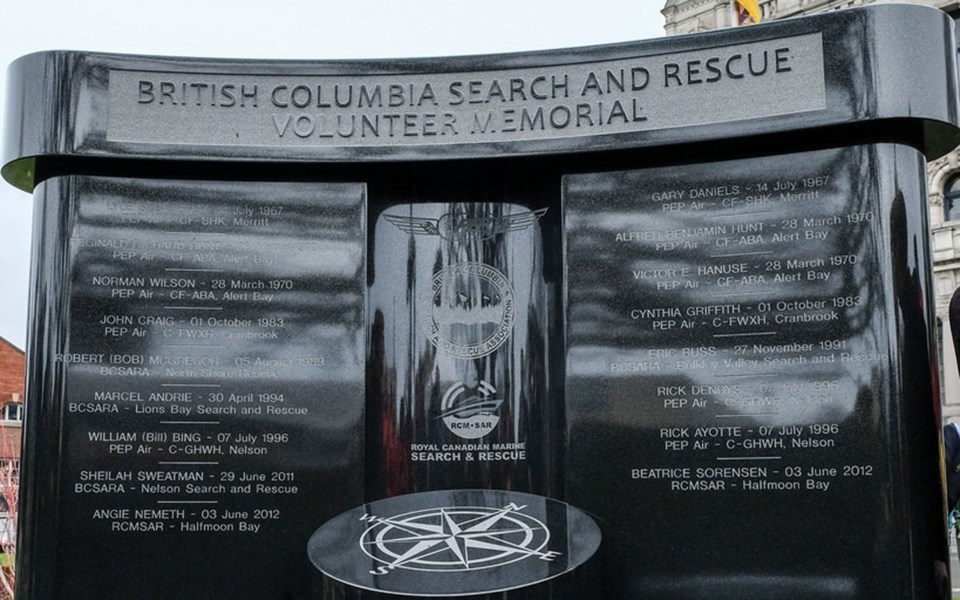It's an amazing experience to glide the glens of B.C.'s alpine, where the silence of snow is unlike any peace you will find elsewhere.
The trip, long anticipated or perhaps a spur-of-the-moment one, is perfect ... until it is not. Suddenly, and without warning, a companion is tomahawking down the couloir, or an avalanche is roaring behind you, or you simply slipped in the night as you left the backcountry hut and the result is a badly broken ankle.
Now the adventure has turned into something else entirely, and in many of these cases, getting back to civilization requires the help of one of the near 80 search-and-rescue (SAR) organizations the province is lucky enough to have in operation.
Each year, search-and-rescue groups in B.C. respond to over 1,600 incidents involving more than 2,100 missing (lost) or injured persons. The 2,500 unpaid professional volunteers have to be available day or night—donating well over 100,000 hours of their time annually on callouts. Incredibly, 95 per cent of the call-out subjects are found or rescued within the first 24 hours of a volunteer SAR group being activated.
If taxpayers had to pay for this volunteer service, it would likely exceed $20,000,000 in direct salary dollars alone—that's excluding infrastructure and capital costs, which are estimated at over $50 million.
This past weekend, following a week that saw 10 separate calls for help to our local RCMP, around six of which had to be passed on to Whistler Search and Rescue (WSAR), B.C. quietly marked BC Search and Rescue Memorial Day on March 2.
"(This) is about recognizing the incredible work of search and rescue volunteers from across British Columbia, and to remember those who died in the line of duty, who lost their own lives while trying to save the lives of others," said Mike Farnworth, B.C.'s minister of public safety, in a release.
"When it comes to recognizing the sacrifice, tenacity and public service commitment of search and rescue volunteers and their families, a simple thank you is simply not adequate. We are forever indebted to the heroic measures this community constantly takes to keep people safe.
"The memory of those who died while in the service of others will live on today and every day through the people who continue to generously devote their time and energy to the safety of the people of B.C."
WSAR's manager Brad Sills knows all to well the very real danger our search-and-rescue volunteers can find themselves in as they strive to bring home our loved ones. Several years ago, he told me that he celebrates two birthdays—one for the day he was born and a second for the day he nearly lost his life while on a rescue on the North Shore.
That we have lost SAR members while they were volunteering to rescue others is a measure of their dedication. But it is also a reality check. Having search-and-rescue members available should not be your fail-safe plan; it is not your Plan B. These rescue experts should not be put in danger because of careless decision-making.
SAR managers assess every rescue they are called out for and consider the risk to the rescuers, as well as the peril of those in need of help, in weighing the actions taken.
This is why it is crucial that those heading out into the slackcountry or the backcountry are ready to self-rescue to the best of their ability and to stay out overnight if need be.
From March 1, 2018 to March 1, 2019, WSAR mobilized 59 times, with this period marking the first time the organization got more call-outs in the summer than the winter. The responses accounted for 1,300 hours of volunteer work.
Sills said last week that members "fear that we're not going to be able to get somebody and they're going to succumb to the issues that follow in the aftermath."
Of course, accidents happen, and we all know that Mother Nature is a fickle master of the backcountry, so search-and-rescue personnel will do as much as they are able to get you home safe.
But there are limits—play within them and honour those who volunteer, or have been lost while on duty in our rescue services, by planning your trip properly, taking all the safety gear needed and educating yourself about how to stay safe out there.




